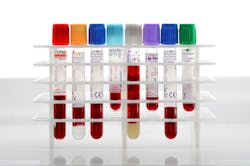Researchers from Lund University in Sweden have discovered higher levels of immune proteins in the blood before and after an epileptic seizure. The possible biomarkers can be identified using a simple blood test. Diagnosing epilepsy is currently resource intensive and distinguishing it from other conditions can be challenging. Better diagnostic methods as soon as the patient seeks medical care after a suspected seizure is therefore an urgent necessity.
Researchers discovered that levels of five inflammation markers – proteins – were elevated acutely in people who had experienced an epileptic seizure.
“We call these markers ‘fingerprints’ since they involve several inflammation-related proteins with different reaction patterns. The patients who had epilepsy showed raised levels of one of the five proteins – IL-6 – even before their seizures, a value that transiently raised even further directly after the seizure,” says Marie Taylor.
Among patients with psychogenic seizures, however, there was no change in the biomarkers. This might mean that a simple blood test on a patient arriving at A&E after a seizure can show whether the immunological response is elevated. If it is not, there is a greater chance that it is a matter of a psychogenic seizure, which provides a first indication of how the patient should be further assessed.

